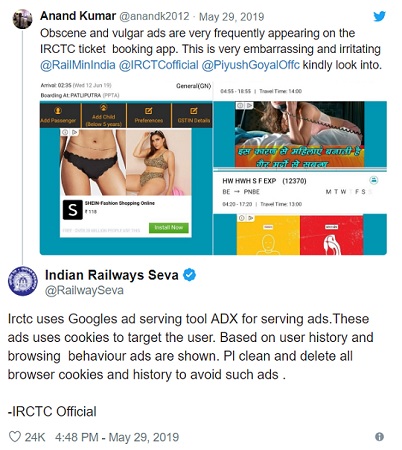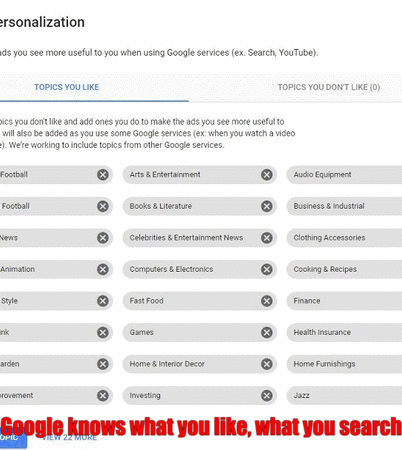If you are on the internet, Google knows you. Google collects a lot of your personal data in order to target ads and improve your experience. So how does Google get your data?

How google serves you personalised ads
Table of Contents
What does Google to know about you?
Google knows your name, email id, home/work address, mobile number age, gender. Google knows what you look like, what you sound like, your political and religious beliefs, the food, books, movies, videos, and stores that you like or dislike, and how healthy you are. The search giant also knows if you have children, or if you have specific dietary restrictions. You could say they might just know you better than you know yourself
- Everything that you have searched using Google search
- All places that you have visited using Google maps including date and time of travel
- All videos that you have watched on YouTube and music you have played on Play Music
- All apps that you have used on your Android device
- All data on Gmail
- All data in Google Photos (locations, people, date, time)
- All events in your life using Calendar
- All your conversations using Hangouts
- Every command you have said using Google Home
See for yourself: https://goo.gl/rTSPPM

What Google knows about You
Its All About the Data!
Data is the new oil, said Mukesh Ambani. Data is what fuels the information economy.
Let’s start with two basic principles that you should be aware of.
- If you are not paying for it, then you are the product. What it means is that if you are not paying money for it and think you are getting it free, then you are paying for it by sharing your personal data with them.
- Google knows as much as what you are willing to share with them.
So how does Google get your data? You are giving it to them by using their ‘free’ products and also unknowingly through other websites and apps which use Google services.
Google Search
The word Google has become synonymous with search. It has become a verb. When you need to know something, you ‘google’ it. It has become more reliable than any other source of information, even your own mother! As you use Google search more and more, they are able to build a profile of what you are looking for. The purpose is to show you targeted ads. So if you search for a holiday destination, expect to see ads for hotels there.
Gmail
You may not like it, but Google has access to all your personal data through your emails. We don’t know what they do with it, but you should be aware that your entire email history is available to them.
Chrome
Chrome offers to save your passwords. While Banks tell you not to tell strangers your passwords, here you willingly save your passwords on a Google product. They also have your browsing history. They helpfully store your profile data like email id, phone number, address, credit card info etc. to auto-fill forms.
YouTube
Yes, they own YouTube. So they know exactly what you watch and what you like to watch.
Android devices
Your phone, tablet and even your TV may be using Android OS. Google is probably tracking you through their location services. Using Google maps tells them exactly where they go. If you save your home and/or work address in Maps, Google knows your schedule, frequent jaunts, etc. They can even track what you are typing if you use the default keyboard.
What about browsing in incognito option?
The only thing that you can be sure about here is that the browsing history and cookies will not be saved. This is not foolproof for google tracking.
So what data does Google collect and from where?
Who you are:
Through various services Google knows how you look like (Through Google Photos’ facial recognition software the company has a basic idea of what you look like), what you sound like (if you’ve ever used voice search on any google or android device), if you have children, your political and religious views, your health status.
How this information is collected: Google Chrome, Google Search, Gmail, Google Photos, Ads, Google Fit
Where you’ve been:
Google ‘s location monitoring and tracking apps use Wi-Fi, GPS and cellular networks to collect data on where you live, your place of work, which locations you visit, where you travel, and how long you’re at a certain place.
How this information is collected: Google Chrome, Google Search, Maps, Calendar
See for yourself: https://goo.gl/rTSPPM
Who are your friends and family:
Google can use your data to also monitor those around you like who you talk to, who you text or email, where you meet, and even what you talk about.
How this information is collected: Google Chrome, Google Search, Maps, Calendar
Who are the people you most frequently converse with? See for yourself: https://goo.gl/7gT8cq
What you like/ dislike:
What are your favourite books, videos, stores, food, music, where you shop and what you buy, basically everything.
How this information is collected: Google Chrome, Google Search, YouTube, Google Shopping, Google Books, News
Your online activity:
At its basic level, Google is a search engine and therefore keeps data on every website you visit, your bookmarked pages, your autofill data, your browser settings, every ad you’ve clicked on, every image you’ve saved, browsing habits, apps you’ve used and more.
How this information is collected: Google Chrome, Google Search, Gmail
See for yourself: https://goo.gl/4XFiLV
What ads to show you:
In order to target the right ads to you, Google collects a ton of data through your every-day browsing activity.
You can review, edit and control this data through here: https://goo.gl/iKqb2u
What if you refuse to use any of the Google products?
If you are on the internet, Google knows you. Typically a lot of websites make money through ad services provided by Google on their pages. One of Google’s revenue sources is the ad service and hence they have trackers on these web sites you browse through. Thus, indirectly Google knows what you are doing on the internet. Princeton’s WebTAP privacy project found that Google’s trackers are installed on 75% of the top million websites. Every time you search through Google or visit any of these websites (or apps), Google is storing that information to target ads at you.
Google also uses apps to collect information. For eg. Uber shares some user data with Google and you have agreed to it when you click ‘I accept’ in the ToS section of the installed app.
Know that Google’s biggest source of revenue is Adwords/advertising. All the information that is being collected is primarily used to target ads at you.
Also, know that they are quite transparent about what data they collect. You can find out what they have from the ‘Your data’ page. You can also check out ‘My activity’ page after you login to your google account and even delete activities that you do not want in the Google databank.
How can I find out what exactly Google knows?
As mentioned earlier Google is quite transparent about this and you can actually download your data that is with Google. Google provides the takeout tool through which you can get all the data. Depending on your internet activity the data could be huge. Easily will be in GBs and can take quite a few hours or even days to process. But you cannot delete anything from Google through the tool or the file. You can analyze and understand what they have.
If this is too overwhelming, you can selectively see what they have.
- An overview through your ad settings. This is how they target ads.
- Your web activities.
- Your location history, especially accurate if you own an Android phone.
- YouTube watch and search
- Check permissions to see which non-google websites and apps that use your credentials through Google.
Is Google evil?
Can’t answer that. Yes, they have a lot of information about users and make a lot of money through hyper-target ads. But they also offer a lot of personalized services and improve your web experience using the same data. Some examples
- Add events to the calendar using email data. Very useful like flight timings
- Can see traffic conditions before travel
- Location specific help like closest restaurants
- Spam filter on gmail is one of the best
- Search suggestions and page results are most relevant
How do I say No to Google?
This is more than a little difficult.
- You can start with ‘stop’ tracking and customizing privacy in your account settings in Google.
- You need to switch to a different search provider, browser, email provider, non-Android phone etc.
- You need to check which websites and apps feed into google and avoid them or at least opt out of google analytics.
- Start using VPN, which is not fool proof, but will at least hide your IP address.
Is it worth it?



